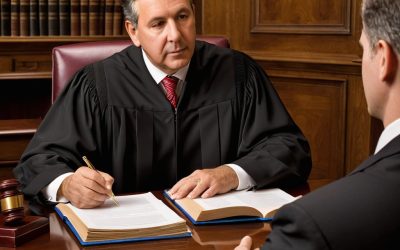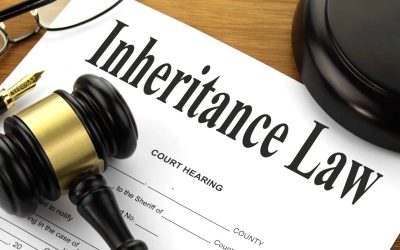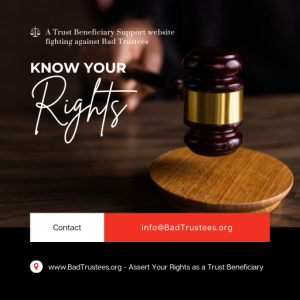Bad Trustees Newsletter
Why a Bad Trustee Would Not Be Entitled to Trustee Fees
⚖️ Why a Bad Trustee Would Not be Entitled to Trustee Fees?Forfeiting Trustee FeesIf the Bad...
Why a Bad Trustee Attorney Might Settle Before Trial
⚖️ Why a Bad Trustees Attorney Might Settle Before Trail?Trust Attorney ExposureIf the Bad Trustee...
Description of a Narcissistic Trustee
A narcissistic trustee,someone entrusted with managing assets or affairs, would likely prioritize their own needs and desires above the interests of the beneficiaries, potentially exploiting their position for personal gain, and exhibiting traits like a sense of entitlement, lack of empathy, and manipulative behavior.
What is “Hometowned”?
“Hometowned” is a slang term in legal circles, meaning a lawyer or client is discriminated against by a local judge who favors local parties and attorneys over those from out of town, essentially experiencing a “home court advantage”.
Who is the petitioner in a probate case?
In a probate case, the petitioner is the person who initiates the legal process by filing a petition with the court to open the estate and seek the appointment of a personal representative.
Who is a Trust Beneficiary?
A trust beneficiary is a person or entity that is designated to receive the benefits of a trust, meaning they are entitled to receive income, assets, or other advantages as outlined in the trust document.
Is it harassment when a trustee deposes a trust beneficiary?
While deposing a trust beneficiary is a legal tool, it can be abused. If a trustee uses a deposition to harass or intimidate a beneficiary, that could be considered misconduct.
Can a Trustee can go to jail for stealing from a trust?
Can a Trustee can go to jail for stealing from a trust?Trustee Embezzlement Yes, a trustee can go to jail for stealing from a trust, but this is rare, and usually the case is handled civilly rather than criminally. If convicted of a criminal offense, a trustee could...






